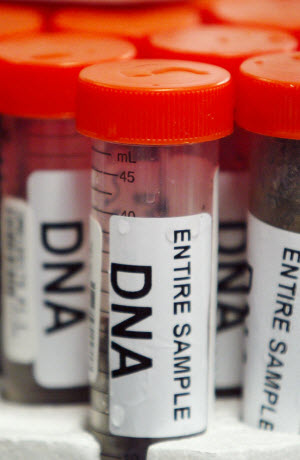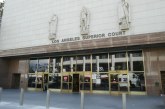
In the wake of last week’s landmark decision by the Supreme Court on DNA databases that could allow police to take DNA samples from people arrested for possibly committing “serious” crimes, many justified the ruling as a way to protect the innocent and catch the guilty.
However, Justice Antonin Scalia and three of the court’s liberal justices disagreed. In a scathing dissent, Justice Scalia argued “solving crime is a noble objective but less important than protecting people from suspicionless searches. Your DNA can be taken if you are ever arrested, rightly or wrongly, for whatever reason.”
He added that he doubted that the founding fathers “would have been so eager to open their mouths for royal inspection.”
Barry Scheck, who helped found the organization that helped to free hundreds of those wrongly accused of crimes, said that the court was wrong to allow DNA to be taken without a search warrant.
Last week he told NBC News, “This is not about DNA databases good or bad, this case is about the warrant requirement and the protections that a neutral detached magistrate gives to the privacy of all citizens.”
Meanwhile, Justice Anthony Kennedy, in drafting the majority decision, drew on a 2000 book by Mr. Scheck and the Innocence Project co-founder, Peter Neufeld.
“In the interests of justice, the identification of an arrestee as the perpetrator of some heinous crime may have the salutary effect of freeing a person wrongfully imprisoned for the same offense,” Justice Kennedy wrote before quoting from the book Actual Innocence.
As the New York Times reports, Adam Liptak notes that Mr. Neufeld was not exactly honored by the use of their book to justify DNA databases.
Writes Mr. Liptak, “Part of the problem was what he called an irony.”
In 2009, Justice Kennedy was part of a 5-4 decision that found that prisoners had no constitutional right to DNA testing, even when such testing might prove their innocence.
The Innocence Project had represented the convicted prisoner who was on the losing end of the case.
However, Justice Kennedy concluded in the more recent case, according to Mr. Neufeld, that “it’s O.K. for the state to take DNA, without a warrant, from mere arrestees, who may ultimately have their charges dismissed.”
Writes Mr. Liptak: “The combination of the two decisions baffled Mr. Neufeld. “That is quite a worldview,” he said of a jurisprudence that allows nonconsensual testing of people presumed innocent but denies voluntary testing to people who insist that they really are innocent.”
“Nor was Justice Kennedy’s brief quotation from ‘Actual Innocence’ especially punctilious,” the reporter notes.
Here is how the Justice rendered it, including his brackets and ellipses: “[P]rompt [DNA] testing … would speed up apprehension of criminals before they commit additional crimes, and prevent the grotesque detention of … innocent people.”
“What we were saying had nothing to do with post-arrest testing of suspects,” said Jim Dwyer, a co-author of the book who is now a columnist for the New York Times. “We were arguing that all evidence should be tested, whether or not a suspect had been charged.”
Mr. Neufeld agreed. “The ‘prompt testing’ is referring to something completely different than the latter phrase,” he said. “Barry, Jim and I never endorsed arrestee databases.”
Mr. Liptak also noted that Justice Kennedy omitted two key words in citing the passage. The authors supported testing that would prevent ” ‘the grotesque detention of thousands of innocent people.’ “
However, Justice Kennedy, Mr. Liptak writes “apparently did not want to endorse the possibility that the criminal justice system had such widespread shortcomings.”
Justice Scalia, from his view, strongly criticized Justice Kennedy’s assertion that the gathtering of DNA would help free the innocent.
He argued, “By the way, this procedure has nothing to do with exonerating the wrongfully convicted, as the court soothingly promises.”
“(The FBI database) includes DNA from unsolved crimes,” he said. “I know of no indication (and the court cites none) that it also includes DNA from all – or even any – crimes whose perpetrators have already been convicted.”
Mr. Scheck does not agree, arguing that Justice Scalia’s argument “goes too far.”
He argued, “There had been times when prisoners had been exonerated through the testing of DNA in closed cases.”
Julie Samuels, a senior fellow at the Urban Institute, studied the issue of DNA collections and exonerations. Mr. Liptak summarizes their study, noting, “All 50 states allow DNA to be collected from people convicted of felonies, and there is no question that those samples have solved cases. But the evidence that the testing of mere arrestees helps in the effort is surprisingly thin.”
Bottom line, the very professionals who work in the field where DNA has helped to exonerate perhaps hundreds of innocent people are very wary of the court decision, and find Justice Kennedy’s justification to be ironic and ad hoc.
—David M. Greenwald reporting





this article borrows heavily from an article linked to innocence project’s website. the NY times link: http://www.nytimes.com/2013/06/11/us/cited-by-a-justice-but-feeling-less-than-honored.html?_r=0
I have found no direct statements ANYWHERE from any innocenceproject.org’s people, that say that innocenceproject thinks it’s ‘wrong’ as the reporter states, to collect DNA evidence from people arrested for serious crimes.
nor do i find any direct statements anywhere that they’re ‘wary’.
I DO find, in the article provided in the link on IP’s website, that they find the decision ‘ironic’, given that the supreme court ruled earlier that post conviction testing was not a constitutional right. which WAS in fact a bad decision in my opinion.
hopefully this new ruling will prompt evolution of the Supreme court’s thought on their prior ruling, and that in time DNA testing will be as routine as fingerprinting. it’s insane that our court system would deny an individual the right to defend themselves against charges by presenting exculpatory evidence (DNA).
Mr. Greenwald, if there are direct statements by members of innocence project, please include them. i find none. this decision by the court is, while ironic in light of their prior decision, a good one, and i don’t believe the innocence project does not support it.
This is directly from Barry Scheck, “This is not about DNA databases good or bad, this case is about the warrant requirement and the protections that a neutral detached magistrate gives to the privacy of all citizens.”
Clearly he opposes DNA databases without warrants/ judicial oversight.
That statement doesn’t provide us with Mr. Scheck’s opinion. It just appears to be Mr. Scheck’s summarizing what a case is about. I found a video on MSNBC of Mr. Scheck giving his opinion, where he says only ‘i personally am kind of a libertarian conservative when it comes to how much control and how much information the state should have over my genetic information.’
this would indicate he’s wary, i agree. that just wasn’t in the article, so i was a little confused.
i don’t think it’s an official innocence project position against collection of DNA evidence.
the key point here is 4th amendment. the unlawful search and siezure. how do we define ‘search and siezure’? If we call DNA, an item that can be searched for and siezed, then it would be a violation of 4th amendment.
but if we call DNA an identifying characteristic, like fingerprints (it is in fact a genetic fingerprint) and photographs, then it is NOT a violation of 4th amendment.
Mr. Scheck, in the video, says there might be the possibility that the DNA could be used to get info on his mental or physical health. this is a stretch. esp for the mental part. and even if were true, that big brother would have all sorts of genetic info, errr… what are ‘they’ going to do with it? seriously? let’s say they ID you as being deficient in a tumor suppressor. see here mr. x, we find you have a mutant BRCA2 gene, you and your relatives will have a higher incidence of breast and ovarian cancer.
DNA is a piece of information, like fingerprints. height. weight, shoe size, photos, hair color. blood type.
Mr. Scheck does not describe what harm there might be, even in the very unlikely event that police would pay the exorbitant amount of money to have an individual’s genome sequenced and analyzed, in police having this information. he only appears to say he is not comfortable with someone else having access to genetic information.
remember folks, people used to make vigorous arguments against taking of fingerprints. and i don’t follow anything on it, but is there a single example where fingerprints have been misused to erroneously convict and/or harm an individual?
Irrespective of whether DNA databases are good or bad is the question of the constitutionality of this procedure. Justice Scalia is to be commended for his consistency in making decisions based on his interpretation of the constitution, rather than on his personal opinions on what is right, as with many of the other judges.
Years ago, the Dixon police did not have probable cause to arrest my friend. Charges were later dropped. In these kinds of situations, law enforcement has no business swabbing saomeone’s mouth and stealing their DNA. It is invasive and wrong and threatens civil rights for all.
*someone’s*
lggee – “what are ‘they’ going to do with it? seriously?”
IMO, that’s not the point. The point is they have no right taking it from an innocent person in the first place.
“…unlikely event that police would pay the exorbitant amount of money…”
In the future, the cost will decrease. They have no business stealing this information from innocent citizens.
you keep saying the same thing over and over. ‘they have no business’. you’ve given anecdotes of you and yours’ encounters with police, which had nothing to do with DNA.
the supreme court has decided that in fact police DO have business collecting identifying genetic information from those arrested.
you have yet to answer the question: what specific harm can come from having a genetic identification? please no more anecdotes about you and yours police encounters. they do not address the issue except to show that you do not appear to like police.
clearly you feel strongly about this issue. why not address it directly, with how it harms an individual’s rights. saying you ‘don’t like’ something isn’t enough. if you were in a court, how would you argue your point to the court that collection of genetic info harms the individual’s rights?
i have yet to see a single argument anywhere, that gives a single example of how collection of DNA information harms or might harm an individual’s rights. your arguments aren’t remotely convincing.
lggee, My innocent friend did have his DNA swabbed from him.
I cannot give y0u further info but I am self-publishing a memoir re: the law enforcement home invasion & how I have tried to reconcile being the daughter of a wonderful cop but being the victim of law enforcement harrassment. I will share my memoir with David G but I still fear for my safety. So I will not share the details with you. Sorry.
“if you were in a court, how would you argue your point to the court that collection of genetic info harms the individual’s rights?”
I’m not in court, I’m writing my opinion on this website. In the 80’s and 90’s,I was in court (due to my job) innumerable times. In the past 6 years, I have also been in court to observe, and sit on 2 juries. I try to not imagine myself being a witness in court. It gives me anxiety.
Off topic, I believe that DA’s should split their time, being defense attorneys & prosecutors. It would make for a more equally balanced judicial system.